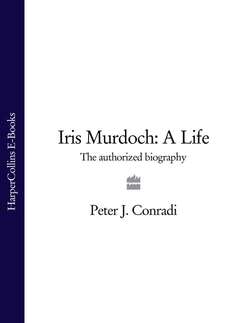Читать книгу Iris Murdoch: A Life: The Authorized Biography - Peter Conradi J. - Страница 25
7
ОглавлениеIris once told her friend from Somerville College, Oxford, Vera Hoar that she had been ‘brought up on love’. ‘She was a denizen of no mean city,’ says Crane. If Froebel was not entirely idyllic, how was life at home in Eastbourne Road? Because Iris was an only child, of very loving parents, and she a loving child, they got on together as if they were all equals.
Iris’s grandmother Louisa once asked Rene whether Iris was going to have any children: ‘I jolly well hope NOT!’ Rene at once returned vehemently, to her mother-in-law’s surprise.41 This exchange, long before Louisa Murdoch’s death in 1947, may be taken as evidence for John Bayley’s theory that Iris’s birth had been a traumatic experience. Rene had been only nineteen, it was a difficult birth, and Rene decided that ‘she wasn’t going to go through that again’, which is why Iris never had a real as opposed to imaginary little brother. Some, John Bayley among them, think that Hughes and Rene’s marriage was a mariage blanc, with abstinence the normal form of contraception, a view Billy Lee, widower of Iris’s quasi-cousin Eva Robinson,* did not find implausible. Perhaps this was not uncommon at the time, despite Marie Stopes, and despite Hughes’s having married Rene in haste when she was pregnant.
If so, various things follow. When The Green Knight came out in 1993 Iris remarked that she might well, like Lucas in that book, have felt murderous towards a real sibling. She would have had to sacrifice herself to a younger brother who, being male, would seriously have embarrassed her education by taking priority. Her father was then a junior civil servant, earning very little. Rene had no money, there was a mortgage and Hughes, determined to give Iris a good education, borrowed from the bank to do so. John Bayley’s hypothesis helps throw light elsewhere. When in The Sea, The Sea Iris has her hero-narrator boast about not being highly sexed, she pointedly subverts contemporary pieties. We do not wish to imagine a hero as less than highly sexed, or a happy marriage as less than ‘fully’ sexual. It does not accord with these pieties, either, to imagine that Rene’s happiness in her self and her body, clear in photographs and reminiscence alike, could have been wholly unrelated to the marriage bed, as the hypothesis would require.
Iris’s adult philosophy, both written and lived, was to give to non-sexual love an absolutely central place. She advocated what she once called to her friend Brigid Brophy ‘a sufficiently diffused eroticism’. It is a striking feature of her fictional universe, too, that love and sexual emotion are ubiquitous and ill-distinguished. Yet chaste love, for her as for Plato, is the highest form of love. A family in which sexual love is sublimated might be one in which – ideally – the currents of love flow even more strongly towards the child, and awaken what Wordsworth termed ‘a co-respondent breeze’. Sublimated love, Bayley remarked, resembles Shakespeare’s mercy, ‘It blesses him that gives, and him that takes’, and was Iris’s natural state. How might this connect with the fact that the adult Iris frequently fell in love with men considerably older than herself? A father adept at sublimating all such impulses — Iris’s cousin Sybil, for example, could not recall Hughes cross, or even imagine it easily – could be, as Hughes was, a source of ‘anxieties’,42 as well as of reverential love. Anxiety and reverence could indeed be two faces of the same emotion. Iris was to comment on this obliquely, and transmuted into high art, in The Black Prince.
